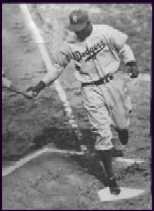Who Killed Jack Robinson?
Frank Thomas Smith
Chapter 8

I told Jimmy McKew that he shouldn’t stay more than one day in Washington. If he couldn’t get to see Senator Kennedy (I didn’t think he would), he could try later on his own time. He should also phone Charlie and tell her where he was staying as soon as he knew. I was being the tough boss, see, letting my subordinate waste his time and my money, but putting down strict limits. Jimmy only smiled though.
“Got it?” I said.
“Sure Darrell,” he answered. “I can tell you already tell you where I’m staying. Got an uncle there, won’t cost anything. I gave Charlie his number.”
“Oh, OK, good.”
“And I have an appointment with Senator Kennedy.”
That really surprised me. “No kidding. How’d you swing that?”
“I telephoned his office, told his secretary I had important information for the senator concerning police affairs in Boston.”
“Did you tell her who you are?”
“Yes sir, but I think she thought I was from Boston. In fact I know it. I heard her talk to the senator, said some private eye from Boston wants to talk to you about police affairs.”
“And you didn’t correct her?”
“Well, no. I mean if she had asked…
“And he said yes, just like that?”
“First he must have asked her what kind of police affairs because she asked me that.”
“So ... what’d you say”?
“I said it had to do with the mafia and the murder of a Negro ballplayer that could blow up to be an extremely delicate matter.”
“And he fell.”
“Well, Darrell, I wouldn’t say that.” He was still smiling, really pleased with himself. “I mean it’s true, isn’t it? If Jackie Robinson’s name ever comes up…
“Yeah, yeah, OK.”
“Can I mention Jackie to him, Darrell?”
“Yes, you’ll have to tell him the whole story – but not Branch Rickey. Our client’s name remains confidential. Understood?”
“Sure, Darrell. Er..by the way…
“What?”
“The appointment is for eight o’clock tomorrow morning, so I better get out to the airport…”
“Go, man … and keep in touch. You may be going directly from there to Charleston, South Carolina.
I had seen Jack Kennedy once at the airport. Those days you had to go through New York to get from Boston to Washington, so he was a frequent flyer on that route before the term existed. Someone checked in for him while he stood a few yards back from the counter smiling at the people – mostly women – who went up to him asking for autographs or just to wish him luck and be on the receiving end of that charm. And that was New York. Imagine the fuss in Boston. It was said that he planned to run for president. I didn’t think he had much chance. A Catholic as president? No way. But I underestimated the power of television. After what happened between him and Jimmy, though, I was for him whatever the odds.
Meanwhile I was busy working the phones. First I called Branch Rickey to tell him of our “progress” so far, then that I’d need a few hundred dollars more to grease some palms in Charleston. He just grunted. Then I contacted the two private detective bureaus in Charleston, having gotten their names from the “American Private Detectives Yellow Pages”. My line was: “I’m looking into the death of a Negro in Charleston a few weeks back. Are you interested in cooperating?” The first one just said “Nah, no niggers” and hung up. Didn’t even ask what was in it for him. The second, Brandon Moultrie of “Moultrie Confidential Inquiries” said he was always willing to cooperate with a colleague. I said that I assumed he had contacts with the police. He said, sure, used to be one of them till he retired because of a disability. So far, so good. Then I asked him if he’d heard of John Rollins. He hadn’t, which didn’t surprise me. From the little I knew about the South, I understood that the Negro and White communities were on different planets. I gave him the few details I had from the newspaper clipping and asked if he could arrange an interview for me with the police detective who handled the case. That’s when he asked about money. I told him his fee would be two hundred dollars, same for the cop. It doesn’t sound like much, but in those days it wasn’t bad for making a contact, in the P.I’s case, and answering a few questions for the cop. Moultrie said. ”Make it three and I don’t see a problem.” He probably figured he had me by the balls, which he did, but I wasn’t giving in that easily. “Two-fifty,” I said, “the extra fifty is because I’m a Yankee.” He sighed, then laughed. He liked that. “You want me to ask the detective anything?” That would have been easier, but I didn’t know him and couldn’t trust him, so I needed to ask the questions myself. I forget what I said, maybe just “no”. Well, sir,” he said, “you give me your number and I’ll get back to you when I have the in-fo-ma-tion.” That could have meant that I should sink in yankee shit – or that he really would call back sometime in the near or distant future. Imagine my surprise when he actually did call back a half-hour later. He said that Detective Robert E. Lee Moultrie agreed to meet with me, preferably during one of his days off, which were Friday and Saturday. It was Thursday, so I said: “How about tomorrow?” Brandon Moultrie must have smiled into the phone. “Yes, Sir, that will be fine. Let us say five o’clock at Jimmy-Joe’s Confederate Bar? All the taxi drivers know it.”
I agreed and asked if Robert E. Lee Moultrie was a relative. “Kissin cousins, Mr. Yankee.”
Continued in the next issue of SCR
